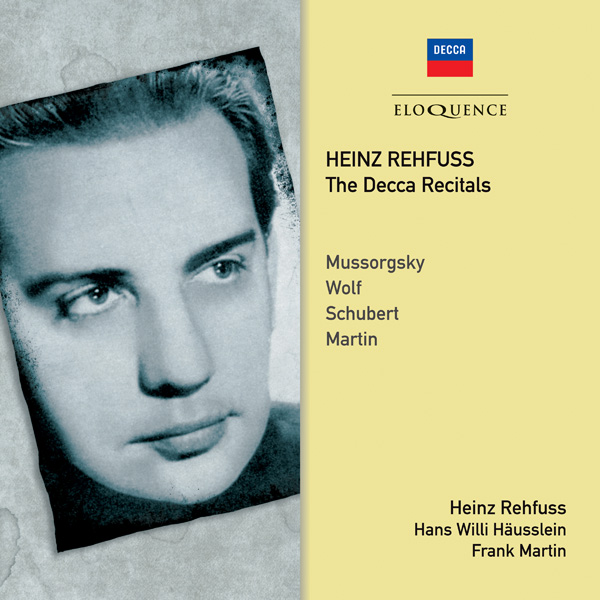In several valuable and newly remastered releases under ‘The Decca Recitals’ banner, Eloquence has compiled tributes to several fine singers of the 1950s whose vocal personality particularly fitted the demands of art song: among them are Jacques Jansen (482 4603), Irma Kolassi (482 4637) and Oda Slobodskaya (480 3524).
They are now joined by an 82-minute, single-CD issue of the song recordings made for Decca by the Swiss baritone, Heinz Rehfuss. Rehfuss was an authoritative and keenly sympathetic presence on sets of ‘Pelléas et Melisande’ (directed by Ernest Ansermet and reissued on Eloquence
480 0133) and the ‘St. Matthew Passio’ (with Hermann Scherchen) which have attained the status of classics. Other Ansermet reissues on which he features include rarities by Ravel (480 0124) and Stravinsky (480 3775).
However, his crystal-clear enunciation of text and cultivated technique were especially suited to German art songs which he performed and recorded in a long partnership with his fellow Swiss, Frank Martin. Several of the Schubert Lieder on this 1955 recording – including ‘Der Wanderer’, ‘Auf dem Donau’ and ‘Gruppe aus dem Tartarus’ all now acknowledged as grave masterpieces – were receiving first recordings: a testament to the baritone’s ambition and imagination. Martin’s own masterpiece in the genre is the ‘Six Monologues from Jedermann’. The cycle was later made famous by Dietrich Fischer-Dieskau but this, more naturally cantabile reading by Rehfuss was honed in close collaboration with the composer.
Another regular recital partner of Rehfuss was Hans Willi Häusslein, founding director of the International Opera Studio at the Zürich Opera. When they recorded a French translation of the ‘Songs and Dances of Death’ by Mussorgsky in June 1953, this cycle was also rarely taken on by non-native singers but throughout his career Rehfuss showed a determination to put his art at the service of unfamiliar and progressive music including the premiere of Nono’s politically motivated opera ‘Intolleranza 1960’. Above all, as John Steane remarked in ‘The Grand Tradition’, in these recitals may be appreciated ‘A beautiful voice, trained to sing beautifully and a brain and heart to guide it – but the beauty comes first’.
MODEST MUSSORGSKY
Songs and Dances of Death (sung in French)
HUGO WOLF
Michelangelo-Lieder
3 Eichendorff-Lieder
2 Mörike-Lieder
FRANZ SCHUBERT
Der Strom, D.565
Der Wanderer, D.649
Totengräbers Heimweh, D.842
Auf der Donau, D.553
Fischerweise, D.881
Der zürnende Barde, D.785
Gruppe aus dem Tartarus, D.583
FRANK MARTIN
Sechs Monologe aus ‘Jedermann’
Heinz Rehfuss, baritone
Hans Willi Häusslein, piano (Mussorgsky, Wolf)
Frank Martin, piano (Schubert, Martin)
FIRST RELEASE ON DECCA CD
Recording Producers: unidentified (Mussorgsky); Peter Andry (Wolf)
Balance Engineers: unidentified (Mussorgsky); Gil Went (Wolf, Schubert, Martin)
Recording Location: Victoria Hall, Geneva, Switzerland, June 1953 (Mussorgsky), 14 October–11 November 1954 (Wolf), 27 October–9 November 1955 (Schubert, Martin)
Remastering Engineer: Chris Bernauer
‘Rehfuss has a firm and attractive tone, a lovely legato, and is a sensitive interpreter of a wide repertoire, including opera, lieder and 20th century works. This very well-filled CD shows his depth…’ The Age, July 2017
‘Rehfuss’s virile voice, with its superb enunciation, is backed by an accompaniment of uncommon eloquence and finesse by the composer … Rehfuss admirably brings out ‘Everyman’s’ range of moods, from dread to repentance when faced with death: he makes very effective use of mezza voce.’ (Martin) Gramophone, May 1982
‘An enormously good performance, helped by extremely clear recording […] with tone, style, technique, good intonation and clarity all in abundance; and with the added advantage of a voice that probably sounds menacing when it asks you to pass the mustard.’
(Mussorgsky) Gramophone, October 1953

